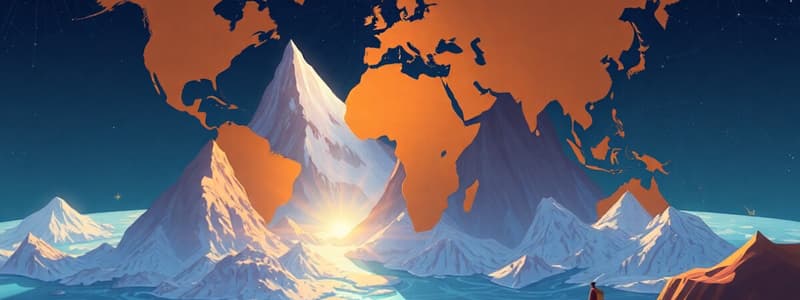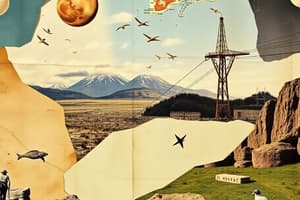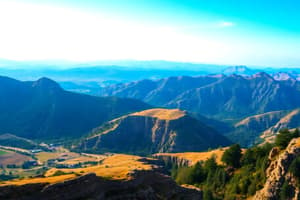Podcast
Questions and Answers
Which branch of geography focuses on natural features and processes?
Which branch of geography focuses on natural features and processes?
- Cultural Geography
- Physical Geography (correct)
- Geospatial Technology
- Human Geography
Geospatial technology includes tools like GIS and remote sensing.
Geospatial technology includes tools like GIS and remote sensing.
True (A)
What term describes the exact coordinates of a location such as latitude and longitude?
What term describes the exact coordinates of a location such as latitude and longitude?
Absolute Location
The five major oceans are the Atlantic, Pacific, Indian, Arctic, and __________ oceans.
The five major oceans are the Atlantic, Pacific, Indian, Arctic, and __________ oceans.
Match the geographical tools with their descriptions:
Match the geographical tools with their descriptions:
Which of the following best describes 'Cultural Landscapes'?
Which of the following best describes 'Cultural Landscapes'?
Urban planning is one of the applications of geographic studies.
Urban planning is one of the applications of geographic studies.
Name one key issue in geography that involves the distribution and migration of populations.
Name one key issue in geography that involves the distribution and migration of populations.
Flashcards are hidden until you start studying
Study Notes
Definition of Geography
- Study of the Earth's landscapes, environments, and the relationships between people and their environments.
Branches of Geography
-
Physical Geography
- Concerns natural features and processes (landforms, climates, ecosystems).
-
Human Geography
- Focuses on human activities, cultures, economies, and the ways they interact with the environment.
-
Geospatial Technology
- Involves tools and methods for mapping and analyzing spatial data (GIS, remote sensing).
Key Concepts in Geography
-
Location
- Absolute Location: Exact coordinates (latitude and longitude).
- Relative Location: Position in relation to other places.
-
Place
- Characteristics that define a location (physical and human traits).
-
Region
- Areas that share common features (cultural, physical, political).
-
Movement
- How and why people, goods, and ideas move from one place to another.
-
Human-Environment Interaction
- Ways humans adapt to, modify, and depend on their environment.
Major Physical Features
-
Continents
- Africa, Antarctica, Asia, Australia, Europe, North America, South America.
-
Oceans and Seas
- Atlantic, Pacific, Indian, Arctic, and Southern Oceans.
-
Mountain Ranges
- Himalayas, Andes, Rockies, Alps.
-
Rivers
- Nile, Amazon, Mississippi, Yangtze.
Important Geographical Tools
-
Maps
- Representations of spatial information; can be physical, political, thematic.
-
Globes
- Three-dimensional models of the Earth.
-
GIS (Geographic Information Systems)
- Technology for capturing, managing, analyzing, and displaying spatial data.
Key Issues in Geography
-
Globalization
- Increased interconnectedness of economies and cultures.
-
Environmental Issues
- Climate change, deforestation, urbanization, and pollution.
-
Population Dynamics
- Distribution, density, migration patterns, and urbanization.
-
Cultural Landscapes
- Ways human activity is reflected in geographical features.
Methods of Study
- Field studies, surveys, remote sensing, and spatial analysis are commonly used to collect geographic information.
Applications
- Urban planning, disaster management, environmental assessment, travel and tourism, and resource management.
Geography Definition
- Study of Earth's landscapes, environments, and relationships between people and their environments.
Branches of Geography
- Physical Geography focuses on natural features and processes
- Examples include landforms, climates, and ecosystems.
- Human Geography focuses on human activities, cultures, economies, and their interaction with the environment
- Geospatial Technology involves tools and methods for mapping and analyzing spatial data
- Examples include GIS and remote sensing.
Key Concepts In Geography
- Location defines a place's position
- Absolute Location refers to exact coordinates using latitude and longitude
- Relative Location refers to a place's position in relation to other places
- Place
- Refers to the unique characteristics that define a location including physical and human traits
- Region
- Refers to areas that share common features, whether they are cultural, physical, or political.
- Movement
- Examines how and why people, goods, and ideas move from one place to another
- Human Environment Interaction
- Examines how humans adapt to, modify, and depend on their environment
Major Physical Features
- Continents include Africa, Antarctica, Asia, Australia, Europe, North America, and South America
- Oceans and Seas include the Atlantic, Pacific, Indian, Arctic, and Southern Oceans
- Mountain Ranges include the Himalayas, Andes, Rockies, and Alps
- Rivers include the Nile, Amazon, Mississippi, and Yangtze
Important Geographical Tools
- Maps are visual representations of spatial information
- Types of maps can include physical, political, and thematic maps
- Globes are three-dimensional models of the Earth
- GIS stands for Geographic Information Systems
- GIS captures, manages, analyzes, and displays spatial data
Key Issues in Geography
- Globalization results in increased interconnectedness of economies and cultures
- Environmental Issues include climate change, deforestation, urbanization, and pollution
- Population Dynamics focuses on population distribution, density, migration patterns, and urbanization
- Cultural Landscapes reflect human activity in geographical features
Methods of Study
- Field studies, surveys, remote sensing, and spatial analysis are used to collect geographic information
Applications of Geography
- Geography has applications in areas such as:
- Urban planning
- Disaster management
- Environmental assessment
- Travel and tourism
- Resource management
Studying That Suits You
Use AI to generate personalized quizzes and flashcards to suit your learning preferences.




